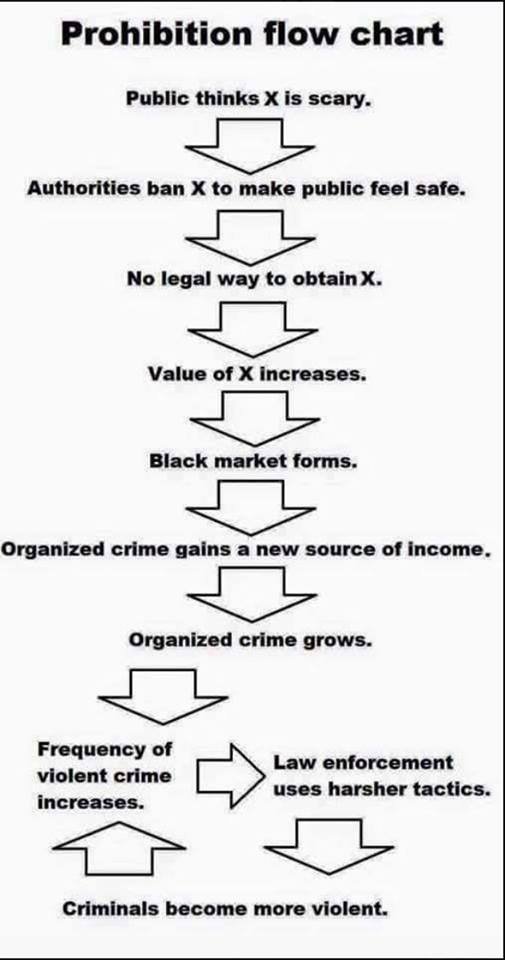I shared this meme on Facebook recently and wanted to discuss it here on Steemit as well.

(source)
The logic seems pretty straight forward and from my perspective fits historical examples of prohibition attempts I've looked into.
My friend @jameskanka replied with this great comment:
But why does organized crime result in more violence? I'd theorize that when no one has a monopoly on violence in a market all parties must form their own codes of conduct and be prepared to enforce them with violence.
By making something illegal the government removes it's monopoly on violence within the market interactions.
Here's my reply:
That's certainly a valid perspective, and it may be true. I personally think humanity's perception of violence has changed. Where war and feuds are "honorable", violence is inevitable. With the introduction of the novel, the Internet, abundance through technology and fossil fuel energy, etc I think enough people in enough parts of the world have moved up Maslow's hierarchy to begin to recognize cooperation is more profitable than conflict. As the world becomes more connected, the codes of conduct you speak of are becoming universally shared and understood (the UN statement on basic human rights is an example). When the world morns death caused by violence, we see evidence of a shared desire to avoid violence across various cultures and people groups.
If the codes of conduct were based on honor culture or if they were severely fractured and varied as they once were (slavery based on ethnicity, slavery based on class systems, treatment of some as sub-human based in their gender, sexual orientation, religious beliefs, etc), then I would agree with you more that violence becomes the inevitable outcome. I think we're seeing this decrease in many ways. It might be a pendulum swinging back and forth with brief rises in things like xenophobia, hate crimes, etc but I still think the overall arch shows a clear direction compared to the past. Things like violent terrorism are not as statistically prevalent as watching the news might suggest, but I might be wrong about that. Maybe strong governments and their monopoly on violence are still needed in many places of the world.
When the government makes something illegal, I think something much worse happens. It ensures the full force of the violent government monopoly will be constantly pushing against that activity. It guarantees only those who are actively participating and skilled in violence can survive and thrive within that marketplace. I do think a portion of the population is psychotic and will harm others without concern. Prohibition, in my mind, legitimizes the need for these people on both sides to either violently oppress an otherwise peaceful market activity or violently defend against and/or attack those who would oppress the market.
We have multiple examples of this playing out from alcohol prohibition to (failed) attempts at various prohibitions within prisons, etc, etc. When the violent threat of government is removed from the equation, markets can function as needed. Rich people don't rely on government protection services but instead hire their own security and work to prevent violence before it happens, not respond to it afterwards.
To expand a bit, I want to reiterate I could very well be wrong here. I'm approaching this from a very privileged position, living in a country which is relatively safe and prosperous. I have to concede that limits my objectivity. I also think black and white principles are easy and comfortable, but can cause trouble when they hit the messiness of real life. To illustrate this, let's use some more contentious examples.
Should there be a prohibition against guns?
Many will answer "absolutely not!" or "or course!" without considering evidence for or against this position in terms of human wellbeing. This is further complicated by powerful lobby groups like the NRA which promote or hinder certain research. It's also difficult to compare the success or failures of government programs across countries because the cultures may be so different that what works in one place would have the opposite effect in another.
To me, the best way to get past these tribalist arguments is to ask basic questions about human wellbeing and clarify the aggressor and defender. A gun, by itself, can't harm anyone as it requires an active agent. That said, having a gun around small children without proper protections may be decrease human wellbeing by increasing accidental death and injury. If some believe they are defending the defenseless by using force to remove those guns, then I can understand their argument, from a certain perspective. Others feel they are being aggressed against for simply owning something and not using it to harm anyone. That, to me, is a very strong argument, and the historical examples of governments (who already have a monopoly on the use of force in a geographic region) controlling who can own or not own weapons to defend themselves points to this being an important concern. Governments have historically killed 260 million people (see democide).
Okay... but what about nukes? What about 3D printed bio weapons?
If guns are hard, what about autonomous killer attack drones? What about suitcase nukes? If, in the future, anyone with an internet connection and a bio 3D printer can create a virus to kill thousands or even 10's of thousands of people... what then? How do our black and white idealistic principles respond to that threat?
Well, for me, I try to use the same measurements as before. How does it impact human wellbeing? Clearly, to me, if one person's freedom had to be restricted to save the lives of 10's of thousands of people, that's an obvious choice. But what about if millions of peoples' freedoms have to be suppressed just for a perceived threat? Can we justify preemptive "defensive" force if it's indistinguishable from the initiation of force? This gets back to the second part of the discussion: how do we differentiate between defensive and aggressive use of force? Clearly the person intending to use a nuke or a bio weapon has demonstrated a very real and present danger and intention to be a bad actor and initiate force against peaceful people. Using force to stop them, to me, is justified. Hopefully our technological advancements in personal and collective defensive technology can keep up with the new threats we'll see in the future.
So who decides what is offensive and what is defensive?
Many think only a Hobbesian Leviathan government can make these decisions and fill this role. There may be other alternatives, such as the one described in this video on conflict resolution in a free society by Man Against The State:
There's also the wisdom of the crowd to consider, and how spontaneous organization within efficient networks with high communication may provide better results than hierarchical, authoritarian approaches. Some examples of non-monopolistic approaches with great success include organizations like Detroit Threat Management which was highlighted in this Reason article.
Can these decentralized networks protect and improve human wellbeing better than governments? Could they decrease the cycle of violence described in the meme which comes from attempting to stop human action with threats of violence?
Maybe the problem starts right at the beginning with "Public thinks X is scary." Maybe we're still stuck in childish thinking, hoping mommy and daddy government will protect us.
Maybe Steemit is a good place to explore these ideas. We don't need utopia, just progress.
What do you think?
Related Articles on Anarchy
- MAGA...? (4 months ago)
- Are Illegal Drugs Harmful and Addictive? Dr. Carl Hart, Neuroscientist, Says Mostly No (4 months ago)
- Delta Paid for Its Own Security Upgrade and Fixed Everything (5 months ago)
- Yeah, it's kinda like that... (5 months ago)
- Do We Need Government? Case Study: Trick-or-Treating (6 months ago)
- Tribalism: Our Shared Enemy (6 months ago)
- My Favorite Libertarian Quotes (9 months ago)
- Should Anarchists Vote? (10 months ago)
- Replying to 13 Tweets on Intellectual Property (10 months ago)
- The Myth of Authority (last year) <-- highly recommended
- NVC: Violence Is a Tragic Expression of an Unmet Need (last year) <-- highly recommended
Luke Stokes is a father, husband, business owner, programmer, and voluntaryist who wants to help create a world we all want to live in. Visit UnderstandingBlockchainFreedom.com










